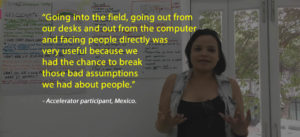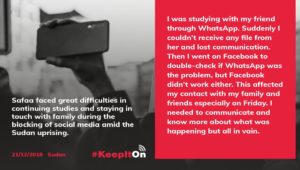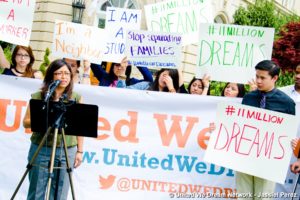On a (fairly) sunny day in early March in London, a group of 15 activists, campaigners, researchers, and journalists, came together for the first time as part of a week-long MobLab campaign accelerator training. Arriving to the space on the first day, I was warmly welcomed by our two facilitators, and looked around the room to catch a glance of the 15 other participants, each engaged in conversation with one another, enjoying their morning coffee.
We spent the next six days getting to know each other better; I learnt about their areas of work, their interests, world views and experiences across a range of issues from the climate and refugee crises, to global and UK electoral politics, to neo-colonialism and broken food production systems, and everything in between. In essence, the aim of the campaign accelerator training is to build skills in designing and delivering people-power campaigns, to create change through actionable ideas, developed through a systems-thinking lens. Over the course of the week, we partook in a journey that presented moments of collaboration and disruption, of brainstorming endless ideas followed by refining specific solutions, of learning about the dynamic processes embedded in designing and delivering impactful public campaigns.
From the conception phase, through storytelling and narrative building, to prototyping, testing, and pitching, the idea of bringing the whole self to the campaign design process was consistently present throughout our discussions. This meant engaging our brain-body connections, bringing in intuition, logic, and creativity, to all campaigning stages. By centring the self (the campaigner or group of campaigners) and our relationships with others as integral components of the design process, our campaigns were articulated in bolder and more honest tones and frankly, were a lot more fun to create.
The first three days saw a lot of discussions on deep systems change, and the ways in which we as individuals and groups can influence ripples of change by challenging systems at different points. We reflected on layers of oppression that we systematically, interpersonally, and internally experience, in the assumptions we make about our own beliefs, and about others.
The tone was set early on, and by the end of the second day the group had settled on a mission statement for the campaigns we were going to create. Building on from daily
reflections, the statement centred social and climate justice rights, and anti-racist and decolonial values; a world where people are empowered to act for their communities, and where alternative narratives are offered to halt the stride of dominant systems of power. One of the terms discussed, and one that I keep coming back to, is ‘social acupuncture’, a concept that seeks to override the inherent tension between incremental change, and systems change. Tension that is familiar to anyone who’s worked in public advocacy and campaigning, especially on long-term issues. The concept of social acupuncture attempts to override this polarity by identifying strategic points of systems’ disruption.
‘Sensing’ is one of those tools that can help identify these moments, and one of my personal favourites, as it allows for building a deeper understanding of the ecosystems and audience we hope to engage with, by testing our assumptions early and often. During our sensing sessions, we developed insights that turned into tangible goals, strategies, and tactics. Importantly, and in doing so, windows of opportunities to articulate alternative narratives, and new systems and solutions, defiantly emerged.
We spent the following days developing campaign stories, testing, prototyping, and exploring how to determine what success looks like. One of my favourite parts of the prototyping phase was the chance to step outside of our discussion circles -and arguablyecho chambers- and get ‘real life’ feedback. For example, we got incredibly insightful responses during a fieldwork session, where we spoke with people on the street, who generously gave us some of their time that day and allowed us to test out our assumptions and challenge our own success metrics.
In addition, two guest facilitators, who are also experienced campaigners and have previously led successful public campaigns in the UK, guided us through our prototyping, giving direct feedback on our asks, and tactics.
By the end of the week, the group had produced three incredible fully fledged campaigns, each with their own unique selling points and creative people powered messages and calls to action, and a lot of common and shared insights. Although the workshop format was relatively familiar; breaking into groups and building ideas together, the more profound part for me, was the way in which the collaborative space was held. Discussing systems change, as well as deeply entrenched and complicated issues of race, gender, class inequality, neo-colonial practices and oppressive global structures can be challenging, if the spaces in which these discussions are held, are perceived, or experienced as unsafe, or exclusionary. I was fortunate to have been a part of a group that thoughtfully held space for one another, and showed up ready to listen, critique and create.
I walked away from the experience with a scrappy notebook full of ideas on campaigning tactics, methods, and concepts, that I now am now working on bringing into my campaigning job. More importantly, I left having made unique connections and friendships with others whose views and contributions I continue to reflect on, and which I am certain will have an impact on my future work.




